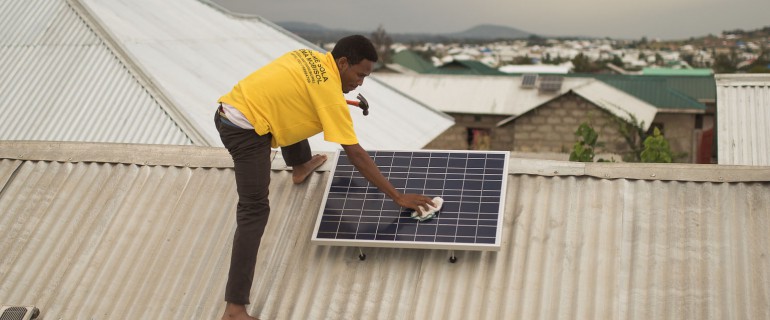by Glenda Pavon-Suriel
According to the International Energy Agency (IEA), 620 million people in Africa still don’t have access to electricity. Many others around the world live in areas where the grid system is unreliable. In Africa, for example, investments in the electricity sector are particularly low, as are rates of electrification compared to other developing regions. Fortunately, an increasing number of solar energy companies are seeing this untapped market as a huge opportunity.
Setting up infrastructure for electricity in many remote areas is cost prohibitive and not likely in the near future, according to German company Mobisol, that is developing a drone and solar panel system as a mini-grid in Rwanda and Tanzania. “People have been waiting 10 or 20 years for the grid and the grid is not going to come, because it’s much too expensive and it’s too big an infrastructure for what people really need,” says Mobisol’s business development manager Thomas Duveau. Companies like Mobisol are bypassing the traditional electrical infrastructure and meeting the energy demands of some African communities using renewable energy and various systems of mini-grids.
One of Mobisol’s unique features is that they have become the grid themselves. “We’re the only company that can claim to substitute the grid,” says Duveau.
Whereas electricity infrastructure projects can be expensive, the decreasing costs of solar energy such as mini-grid technologies like Mobisol’s are affordable for developers and users alike. A Mobisol drone costs $21 a month over the course of 36 months and customers can pay back the cost of their equipment and choose to own it at the end of the 36 months. A Mobisol drone user can also opt to become part of the drone network, offering their roof as a charging station for other drones and get credit on their bills to offset monthly repayment costs. The drones then become interconnected and form their own network or mini-grid. The solar drones are not only affordable, but they can be profitable for many families. The company claims that the drone system could eventually enable “families to become micro-entrepreneurs, for instance charging phones and laptops for other villagers, and setting up barber shops or small cinemas.”
Renewable energy projects like Mobisol’s present tremendous opportunities not only to bring electricity to remote areas, but also to demonstrate the potential of alternative energies like solar and wind energy. The implication is that the renewable energy industry will very likely be the future of some of the poorest areas of the world.
Leo Schiefermueller, managing director of TerraProjects, a renewable energy consulting firm, said: “We believe up to 120 million, about 20 percent of the people in non-electrified regions in Africa, could be connected to mini-grids.” So far Mobisol has signed up about 40,000 families, or 200,000 people.

